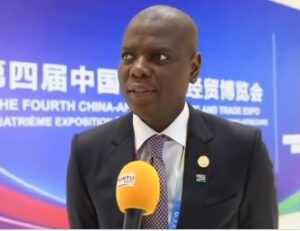Taiwan Semiconductor Manufacturing Co. (TSMC), the world’s largest contract chipmaker and a key supplier to major U.S. technology firms, has announced plans to invest an additional $100 billion in the United States. This expansion, which includes the construction of five new semiconductor facilities, was revealed by TSMC CEO C.C. Wei alongside former U.S. President Donald Trump at the White House, Reuters reported.
The move has ignited backlash in Taiwan, where critics argue that TSMC is prioritizing U.S. interests at the expense of the island’s economy. Some detractors have gone as far as accusing the company of becoming “USMC”—a reference to its perceived shift towards American control—while condemning the ruling Democratic Progressive Party (DPP) for “selling out Taiwan.”
TSMC’s latest investment builds upon its ongoing $65 billion semiconductor manufacturing expansion in Phoenix, Arizona. Once completed, the company’s total U.S. investment is expected to reach $165 billion, according to a corporate statement released on Tuesday.
The new expansion plan outlines three additional chip fabrication plants, two advanced packaging facilities, and a major research and development center. However, the company has not provided a specific timeline for when these projects will be completed.
During the announcement, Trump emphasized the strategic importance of semiconductor manufacturing for the United States, stating:
“We must be able to build the chips and semiconductors that we need right here. It’s a matter of national security for us.”
This statement aligns with Washington’s broader efforts to secure supply chains and reduce reliance on Asian semiconductor production, particularly from Taiwan, which remains a critical player in the global chip industry.
Taiwanese Public and Political Reaction
TSMC’s decision to expand its U.S. presence has drawn widespread criticism within Taiwan, particularly from local media and opposition voices. According to a report by the Global Times, the reaction from readers of Taiwan-based China Times was overwhelmingly negative. One comment read:
“The Americans didn’t even pay a cent, yet TSMC rushed over. Seems like it’s changing its name into ‘USMC’, and Lai Ching-te is even bowing in gratitude to Trump.”
Another comment framed the move as a further example of the DPP government prioritizing foreign interests over Taiwan’s own industrial and economic well-being.
Concerns over TSMC’s increasing alignment with U.S. interests were also reflected in the financial markets, with TSMC’s stock price falling 2.25 percent when trading opened on Tuesday following the announcement, according to Reuters.
The Taiwan Affairs Office of the State Council weighed in on the controversy, with spokesperson Zhu Fenglian accusing the DPP of leveraging Taiwan’s semiconductor industry for political gain. She stated that the ruling party has been:
“Yielding to external forces, using Taiwan’s semiconductor industry and leading enterprises as bargaining chips in their attempt to seek independence by relying on foreign support.”
She further criticized the DPP for treating major Taiwanese companies as “gifts” to foreign governments, arguing that such actions have undermined the long-term interests of the island’s economy and its people.
Zhu Songling, a professor at Beijing Union University’s Institute of Taiwan Studies, echoed these concerns, asserting that TSMC’s shift towards U.S. operations suggests a potential dismantling of the company’s Taiwan-based facilities.
“The Taiwan chipmaker’s development trajectory and investment direction suggest it’s highly likely that TSMC will be gradually dismantled and absorbed by the U.S.,”
he told **Global Times** on Tuesday.
According to Zhu Songling, the decision to allocate such a significant investment to the United States serves American geopolitical and economic interests rather than TSMC’s own strategic needs.
“At the core of this strategy lies America’s ambition for technological dominance, trying to gain control over key chip manufacturers and reduce reliance on the Asian supply chain,”
he noted.
This shift, he argued, could have severe repercussions for Taiwan’s economy. As the semiconductor industry represents one of the island’s most critical economic pillars, moving advanced manufacturing capabilities to the U.S. could accelerate Taiwan’s industrial decline, further weakening its position in global markets.
Beyond the economic impact, Zhu also warned that Taiwan’s geopolitical standing could be diminished. Historically, the U.S. has provided Taiwan with security assurances in part due to its strategic importance as a semiconductor hub. However, as Taiwan’s chip manufacturing power moves offshore, Washington’s commitment to the island may weaken.
“Losing TSMC will also undermine Taiwan’s international strategic value,”
Zhu said, suggesting that the DPP’s continued resistance to changing geopolitical realities could lead to unfavorable outcomes for Taiwan’s future.
















